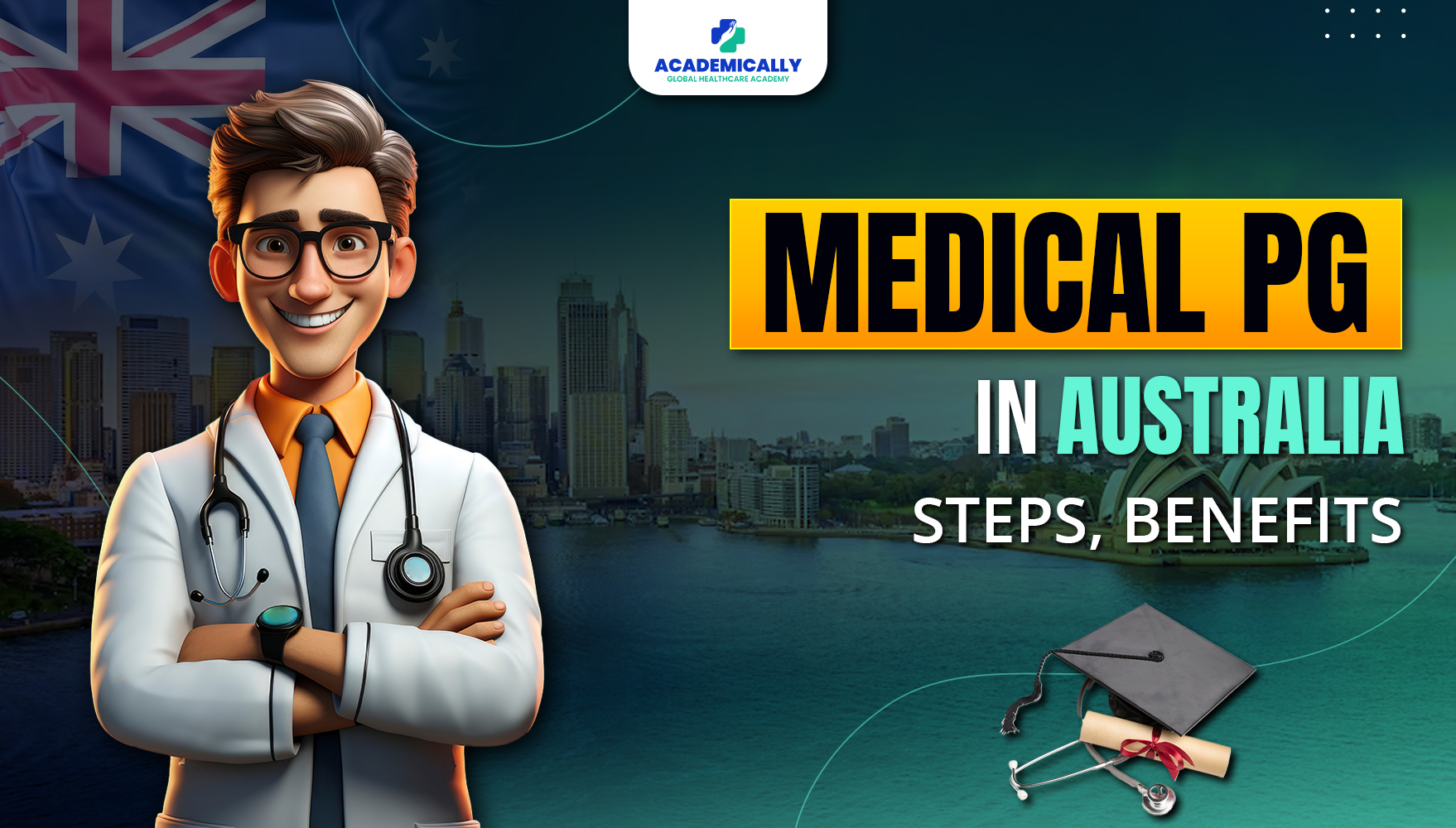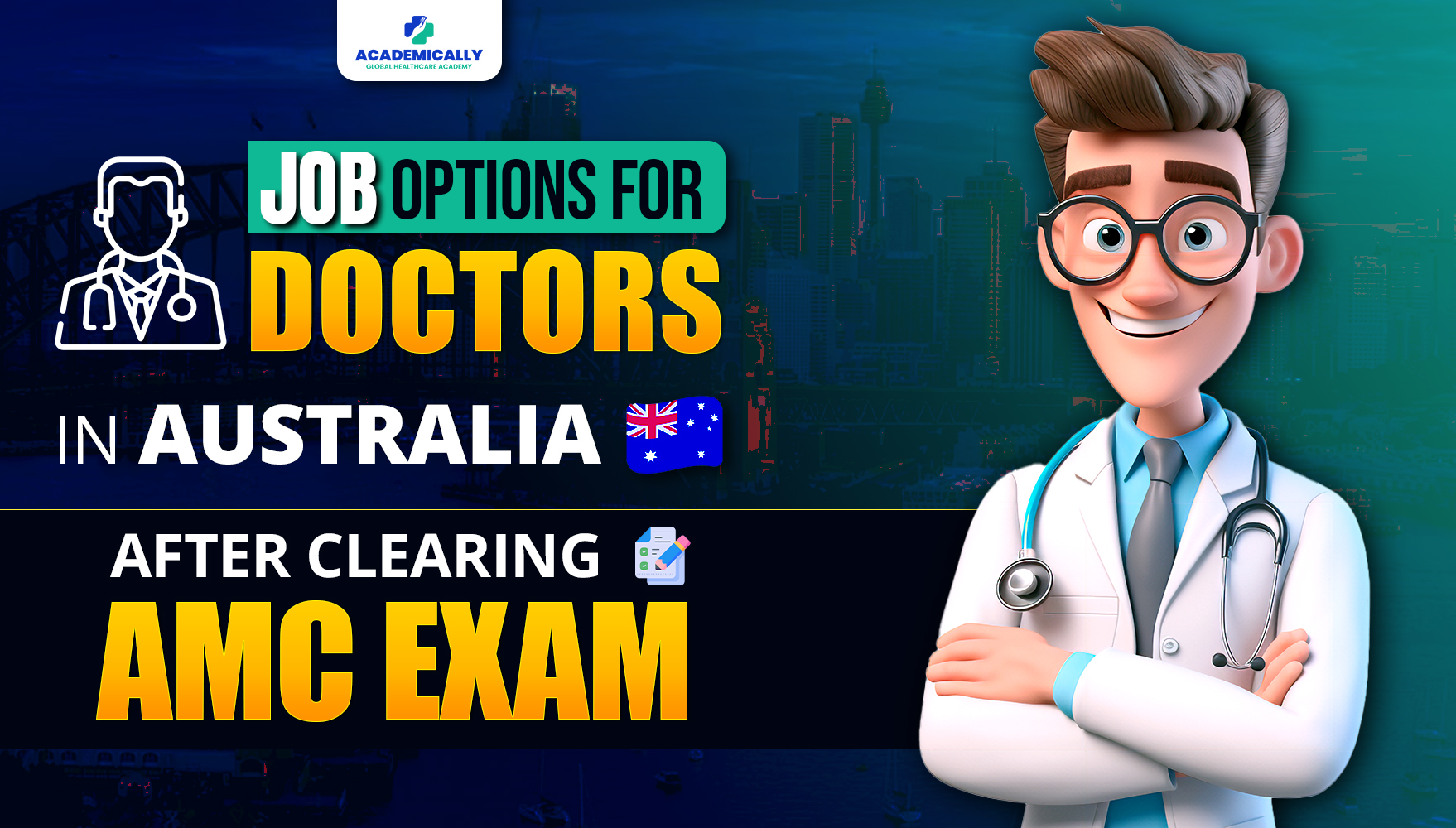Australia has long been the dream destination for medical graduates, either for work or further education. The healthcare sector of the country is one of the best in the world. With cutting-edge facilities and world-class education, the country has a lot to offer young medical graduates.
Not only this, Australia requires doctors by the thousands. Pursuing a Medical PG in Australia will ensure job security, benefits, and a medical career one can only dream of.
But how do you get into a medical degree course? Well, getting into a Medical PG program in Australia is not the same as pursuing a master’s in a subject like a language.
This blog will take you through the entire process of getting into your dream medical college in Australia after your bachelor’s. Let’s get to it.
Why Pursue A Medical PG In Australia?
There are several exquisite perks of pursuing a medical PG in Australia, which include the following-
Global Recognition
- Having a PG qualification from Australia can boost your professional standing.
- An Australian medical degree is recognized and respected worldwide.
- It will open doors to opportunities around the globe.
Quality Education and Training
- Australia offers high-quality medical education and training.
- PG programs are designed to meet international standards
- Graduates are equipped with the knowledge and skills for real-world practice.
Facilities
- Australian medical institutions have access to advanced medical technologies.
- This exposure keeps students updated with the medical advancements.
Diverse Clinical Exposure
- Australia's healthcare system provides varied clinical experiences.
- This allows students to gain experience in different medical settings.
- This helps graduates to develop a well-rounded skill set.
Quality of Life
- Australia consistently ranks high for quality of life.
- It offers a strong economy and excellent healthcare.
- It is one of the best countries to build a life and career in.
Opportunities for Migration
- Completing a medical PG program in Australia may create pathways for migration.
- Australia has a points-based immigration system.
- Holding an Australian medical degree means you’ll be able to apply for skilled migration.
How to Enter A Medical PG Program in Australia
The Eligibility Requirements
Before you step into the process of applying to a Medical PG program in Australia, let us understand the prerequisites.
- The obvious one is having a recognised medical degree. For Indian students, this is your MBBS degree.
- The next point is to be registered in the home country.
- The most important part is to pass the AMC exams.
You see, medical education in Australia is heavily regulated. This is how they have built a reputable and dependable healthcare system. To ensure the competency of the incoming medical professionals, the Australian Medical Council assesses them.
For this, they have the AMC Exam. This exam is divided into two parts:
AMC Part 1: A CAT MCQ-based exam
AMC Part 2: A Clinical Exam
What is the AMC Exam?
The AMC Assessment exams are the biggest checkpoint in your journey to medical PG in Australia.
As mentioned, they are a set of two exams. Together, they test your theoretical knowledge and practical skills. Here is a brief snapshot of the exam.
AMC Test- Format Comparison
| Details | AMC MCQ Exam | AMC Clinical Exam |
| Name | AMC CAT MCQ Exam | AMC Clinical Exam |
| Mode of Exam | Computer based | In-person or Computer-based (limited slots available) |
| Exam Date | Anytime between February and November | AMC releases dates on its website for scheduling the in-person exam. |
| Exam Center | Exam held globally | Melbourne, Australia (In-person) |
| Exam Duration | 3.5 Hours | 3-4 Hours |
| Number of Questions | 120+30 items (Total 150 items) | 16 stations total |
| Passing Score | 250/500 | 9 out of the 14 stations |
Now that you know the main requirement, let us start with the actual process.
Step 1: Document Verification
This step includes the AMC Portfolio creation and EPIC Verification.
- Ensure that your educational qualifications and work experience are as per the AMC requirements.
- Create your AMC Candidate account.
- Compile and submit the necessary documents for verification.
- This includes your:
- Medical degree
- Internship details
- Additional qualifications
Prerequisites For Document Verification
This is also known as the initial Skill Assessment. It is the first and most important part of the process. Your identity is confirmed, and your qualifications are verified. The documents required for skill assessment are-
- Medical Degree (MBBS or MD/MS)
- Educational Transcript
- Valid Passport
- Government ID Proof
- Work Experience Evidence (If Any)
- Medical Registration Certificate
- Passport-Sized Photograph.
Step 2: AMC 1 Examination
Once your documents are verified, you can schedule your AMC Exam. The AMC 1 exam can be taken in your home country.
Find out your AMC Exam center here: Where to write the AMC Exam Centres | Academically Global
How To Schedule the AMC Exam
There are a few simple steps to follow to register for the exam.
- Create Mylntealth/EPIC account.
- Create an AMC account.
- Upload documents and credentials
- Apply for verification of documents.
- Nominate AMC to receive the reports.
- Create an AMC portfolio.
- Register for the exam.
- Schedule exam date.
- Select the nearest available exam center.
- Take the AMC Exam.
Step 3: AMC 2 Examination/ WBA Program
Once you’re done with the AMC 1 exam, apply for the AMC 2 exam.
- This exam is held in Melbourne, Australia.
- There are options for taking this online, but spots are scarce and the price is high.
- You can schedule your AMC 2 exam through your AMC candidate account.
Alternatively, you can also enrol in the Workplace-Based Assessment program.
- This is a 6-month supervised work period.
- This takes place only in Australia.
- You can apply to the hospital of your choice, given the availability.
- At the end of the WBA, you will be assessed orally.
Step 4: English Proficiency Exam
After clearing both the AMC exams, it is time for the language assessment. It is essential to showcase your proficiency in the language if you’re from a non-English-speaking country.
Your proficiency in English can be demonstrated by taking an English language proficiency exam. The accepted exams include:
IELTS - International English Language Testing System: Band of 7 or above
PTE - Pearson Test of English: Score of 65 or above, and
OET -Occupational English Test: Grade B or above
Step 5: Registration + 1 Year Residency
- Once you clear the AMC exam, apply for medical registration.
- The Medical Board of Australia is the registration body in the country.
- After getting your license, apply for a one-year supervised residency.
- This is also known as the Internship Year.
- You can do this in an accredited Australian hospital.
Step 6: Apply For PG (Postgraduate)
- Apply for Medical Postgraduate Training positions after completing your residency.
- Shortlist medical colleges or hospitals offering specialised training programs in your chosen field of study.
- Submit applications to the respective college or hospital
- Once accepted into a PG training program, begin your supervised training.
- You’ll study and work under the supervision of experienced medical professionals.
After you successfully complete the required training period and assessments, you can obtain a fellowship status with the relevant medical college.
This signifies your specialisation in the chosen field.
What Next?
After completing your medical PG in Australia, there are several paths to choose from. Your decision should depend on your career goals and plans.
Some common pathways include the following-
Specialist Registration
- Apply for specialist registration.
- Since you are already registered with AHPRA, you need to add your specialist registration.
Fellowship Training
- Some medical professionals choose to pursue fellowship training in a specialised area.
- This involves additional supervised practice and training.
- It helps them to gain expertise in a particular field of medicine.
Clinical Practice
- Most graduates choose to enter clinical practice.
- Here, they apply the knowledge and skills acquired during their PG program.
- This could involve working in hospitals, private clinics, or other healthcare settings.
Research and Academia
- After your medical PG, you can also enter research and academia.
- Explore opportunities in universities, research institutions, or medical schools.
- Engage in research projects, publishing papers, and contributing to academic endeavours.
Teaching and Training
- Medical professionals with postgraduate qualifications can take on roles as educators.
- Contribute to the training and education of medical students, residents, or junior doctors.
Private Practice
- Some medical professionals choose to establish private practices.
- Although setting up a private practice might be more expensive, it is a lucrative option in the long run.
Medical PG in Australia is a path that leads to endless opportunities.
After a few years of practice, you become eligible for a PR or permanent residency. This allows you to relish the various perks of living as an Australian resident.
Completing a medical PG in Australia can open up opportunities for you:
- High-paying jobs
- Outstanding work opportunities
- Quality of life, and
- Prospects of permanent residency
Final Thoughts
Taking the AMC exam is mandatory for medical graduates who wish to pursue medical post-graduation in Australia. To ensure the process is smooth and successful, it is important to have proper guidance.
Academically helps global doctors prepare for the AMC exam and undertake the registration process with ease.
We help not only by providing world-class AMC Preparation Courses, but also help in:
- Visa Application Process
- Shortlisting Medical Colleges
- SOP and Resume Building
- Peer Support Groups
- 1-on-1 Interaction with successful alumni





